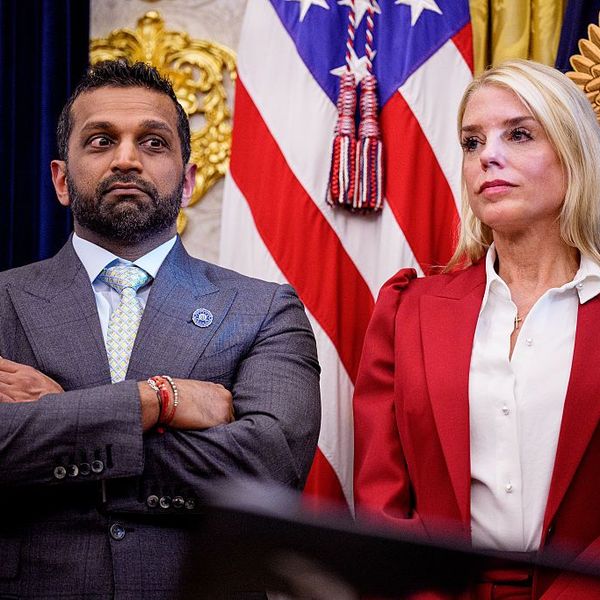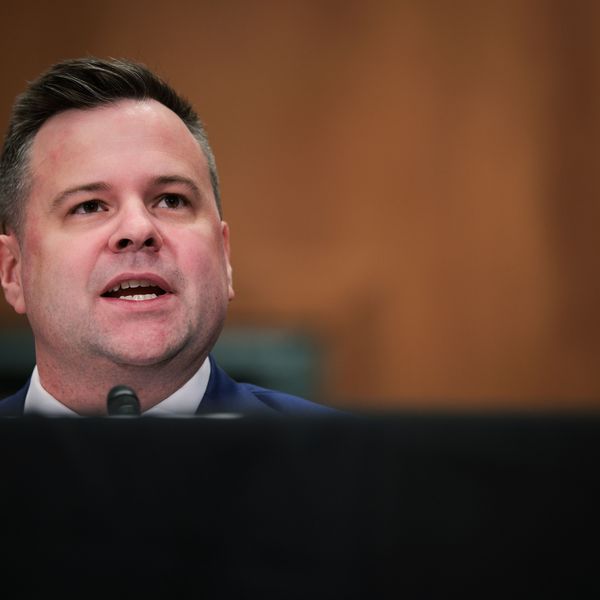
"The ethics program needs to be stronger than it is," Shaub told NPR in an interview. (Photo: ash_crow/flickr/cc)
Citing 'Current Situation' Under Trump, Government Ethics Chief Resigns
"The current situation has made it clear that the ethics program needs to be stronger than it is."
Following months of repeated battles with the Trump administration over its reluctance to comply with even the most basic standards of transparency, Office of Government Ethics (OGE) Director Walter Shaub Jr. announced his resignation on Thursday, citing problems with "the current situation" at the White House.
"This president has repeatedly repudiated democratic norms for transparency, accountability, and ethics for the most powerful position in the federal government."
--Alex Howard, Sunlight FoundationRecent developments have "made it clear that the ethics program needs to be stronger than it is," Shaub told NPR in an interview. His resignation is effective July 19, at which point he is set to work for The Campaign Legal Center, where he said he will "have more freedom to push for reform."
"The great privilege and honor of my career has been to lead the OGE's staff and community of ethics officials in the federal executive branch," Shaub wrote in his letter of resignation. "They are committed to protecting the principle that public service is a public trust, requiring employees to place loyalty to the constitution, the laws, and ethical principle above private gain."
Shaub is the second ethics official to resign in recent weeks. As Common Dreams reported, corporate crime watchdog Hui Chen chose to leave the Department of Justice recently because she found it impossible to "hold companies to standards that our current administration is not living up to."
Of the many clashes between Shaub and the Trump White House, the most prominent conflict was over the administration's refusal to reveal the names of staffers who had received ethics waivers.
NPR reported:
In April, Shaub began publicly demanding that the White House make those waivers public. He won that battle at the end of May, when the administration released the information for White House appointees, including chief of staff Reince Priebus, counselor Kellyanne Conway and chief strategist Steve Bannon.
Waivers are considered public documents, but the Trump White House had been holding them back, saying OGE lacked the legal authority to require disclosure. After weeks of back and forth, the administration did start to post the waivers online and Shaub said public disclosure of "the waivers is critical to ensuring that agencies and individual appointees are adhering to ethics requirements."
Shaub also rebuked Trump for his refusal to hold his advisors accountable. When presidential counselor Kellyanne Conway endorsed Ivanka Trump's clothing line and told people to "go buy [her] stuff on "Fox & Friends" in February, Shaub argued that Trump's refusal to take action was indicative of a deep lack of commitment to common ethical standards.
"Presidential administrations," Shaub wrote, "have not considered it appropriate to challenge the applicability of ethics rules to the entire executive branch."
Alex Howard of the Sunlight Foundation argued that Shaub's resignation should "be taken as a bat signal to Members of Congress who, despite reams evidence of unresolved conflicts, have been far too reticent to oversee ethics in government or threats to transparency under the Trump administration."
"This president has repeatedly repudiated democratic norms for transparency, accountability, and ethics for the most powerful position in the federal government," Howard concluded. "Until President Trump holds himself subject to federal ethics laws, disclosing his tax returns and divesting from his foreign and domestic business interests, both real and rumored corruption will continue to put this presidency in shadow."
An Urgent Message From Our Co-Founder
Dear Common Dreams reader, The U.S. is on a fast track to authoritarianism like nothing I've ever seen. Meanwhile, corporate news outlets are utterly capitulating to Trump, twisting their coverage to avoid drawing his ire while lining up to stuff cash in his pockets. That's why I believe that Common Dreams is doing the best and most consequential reporting that we've ever done. Our small but mighty team is a progressive reporting powerhouse, covering the news every day that the corporate media never will. Our mission has always been simple: To inform. To inspire. And to ignite change for the common good. Now here's the key piece that I want all our readers to understand: None of this would be possible without your financial support. That's not just some fundraising cliche. It's the absolute and literal truth. We don't accept corporate advertising and never will. We don't have a paywall because we don't think people should be blocked from critical news based on their ability to pay. Everything we do is funded by the donations of readers like you. Will you donate now to help power the nonprofit, independent reporting of Common Dreams? Thank you for being a vital member of our community. Together, we can keep independent journalism alive when it’s needed most. - Craig Brown, Co-founder |
Following months of repeated battles with the Trump administration over its reluctance to comply with even the most basic standards of transparency, Office of Government Ethics (OGE) Director Walter Shaub Jr. announced his resignation on Thursday, citing problems with "the current situation" at the White House.
"This president has repeatedly repudiated democratic norms for transparency, accountability, and ethics for the most powerful position in the federal government."
--Alex Howard, Sunlight FoundationRecent developments have "made it clear that the ethics program needs to be stronger than it is," Shaub told NPR in an interview. His resignation is effective July 19, at which point he is set to work for The Campaign Legal Center, where he said he will "have more freedom to push for reform."
"The great privilege and honor of my career has been to lead the OGE's staff and community of ethics officials in the federal executive branch," Shaub wrote in his letter of resignation. "They are committed to protecting the principle that public service is a public trust, requiring employees to place loyalty to the constitution, the laws, and ethical principle above private gain."
Shaub is the second ethics official to resign in recent weeks. As Common Dreams reported, corporate crime watchdog Hui Chen chose to leave the Department of Justice recently because she found it impossible to "hold companies to standards that our current administration is not living up to."
Of the many clashes between Shaub and the Trump White House, the most prominent conflict was over the administration's refusal to reveal the names of staffers who had received ethics waivers.
NPR reported:
In April, Shaub began publicly demanding that the White House make those waivers public. He won that battle at the end of May, when the administration released the information for White House appointees, including chief of staff Reince Priebus, counselor Kellyanne Conway and chief strategist Steve Bannon.
Waivers are considered public documents, but the Trump White House had been holding them back, saying OGE lacked the legal authority to require disclosure. After weeks of back and forth, the administration did start to post the waivers online and Shaub said public disclosure of "the waivers is critical to ensuring that agencies and individual appointees are adhering to ethics requirements."
Shaub also rebuked Trump for his refusal to hold his advisors accountable. When presidential counselor Kellyanne Conway endorsed Ivanka Trump's clothing line and told people to "go buy [her] stuff on "Fox & Friends" in February, Shaub argued that Trump's refusal to take action was indicative of a deep lack of commitment to common ethical standards.
"Presidential administrations," Shaub wrote, "have not considered it appropriate to challenge the applicability of ethics rules to the entire executive branch."
Alex Howard of the Sunlight Foundation argued that Shaub's resignation should "be taken as a bat signal to Members of Congress who, despite reams evidence of unresolved conflicts, have been far too reticent to oversee ethics in government or threats to transparency under the Trump administration."
"This president has repeatedly repudiated democratic norms for transparency, accountability, and ethics for the most powerful position in the federal government," Howard concluded. "Until President Trump holds himself subject to federal ethics laws, disclosing his tax returns and divesting from his foreign and domestic business interests, both real and rumored corruption will continue to put this presidency in shadow."
Following months of repeated battles with the Trump administration over its reluctance to comply with even the most basic standards of transparency, Office of Government Ethics (OGE) Director Walter Shaub Jr. announced his resignation on Thursday, citing problems with "the current situation" at the White House.
"This president has repeatedly repudiated democratic norms for transparency, accountability, and ethics for the most powerful position in the federal government."
--Alex Howard, Sunlight FoundationRecent developments have "made it clear that the ethics program needs to be stronger than it is," Shaub told NPR in an interview. His resignation is effective July 19, at which point he is set to work for The Campaign Legal Center, where he said he will "have more freedom to push for reform."
"The great privilege and honor of my career has been to lead the OGE's staff and community of ethics officials in the federal executive branch," Shaub wrote in his letter of resignation. "They are committed to protecting the principle that public service is a public trust, requiring employees to place loyalty to the constitution, the laws, and ethical principle above private gain."
Shaub is the second ethics official to resign in recent weeks. As Common Dreams reported, corporate crime watchdog Hui Chen chose to leave the Department of Justice recently because she found it impossible to "hold companies to standards that our current administration is not living up to."
Of the many clashes between Shaub and the Trump White House, the most prominent conflict was over the administration's refusal to reveal the names of staffers who had received ethics waivers.
NPR reported:
In April, Shaub began publicly demanding that the White House make those waivers public. He won that battle at the end of May, when the administration released the information for White House appointees, including chief of staff Reince Priebus, counselor Kellyanne Conway and chief strategist Steve Bannon.
Waivers are considered public documents, but the Trump White House had been holding them back, saying OGE lacked the legal authority to require disclosure. After weeks of back and forth, the administration did start to post the waivers online and Shaub said public disclosure of "the waivers is critical to ensuring that agencies and individual appointees are adhering to ethics requirements."
Shaub also rebuked Trump for his refusal to hold his advisors accountable. When presidential counselor Kellyanne Conway endorsed Ivanka Trump's clothing line and told people to "go buy [her] stuff on "Fox & Friends" in February, Shaub argued that Trump's refusal to take action was indicative of a deep lack of commitment to common ethical standards.
"Presidential administrations," Shaub wrote, "have not considered it appropriate to challenge the applicability of ethics rules to the entire executive branch."
Alex Howard of the Sunlight Foundation argued that Shaub's resignation should "be taken as a bat signal to Members of Congress who, despite reams evidence of unresolved conflicts, have been far too reticent to oversee ethics in government or threats to transparency under the Trump administration."
"This president has repeatedly repudiated democratic norms for transparency, accountability, and ethics for the most powerful position in the federal government," Howard concluded. "Until President Trump holds himself subject to federal ethics laws, disclosing his tax returns and divesting from his foreign and domestic business interests, both real and rumored corruption will continue to put this presidency in shadow."

